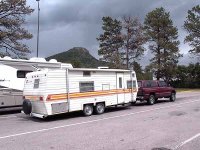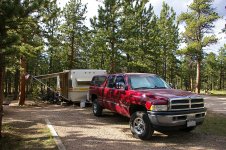JohnD
Moved on to the next thing...
I'm just curious what is the difference between the bearings and lubrication in a sealed for life bearing versus the properly lubricated EZ lube hub? Do they use special bearings and magic grease?
And why would you not have to change a lifetime lube bearing set every year, or 10,000 miles?
Are we just reacting to what Dexter is dictating to maintain a warranty? Or a practical lube schedule?
IMHO, the lube schedule is unreasonable, impractical, unnecessary, and very expensive, and serves to scare and mislead those that are unfamiliar with bearing and lubrication to the point that they would spend $200 on an annual basis only having operated the bearings for 2000 miles.
2000 miles at 45 miles per hour would equal only 44 hours of operation. Hardly enough time to oxidize or corrupt the lubricant, certainly not to the point that the old grease could not be purged from the system, and normal operations resumed.----Just Saying
I don't think that laboratory test would support the need for annual, or 10,000 mi hand pack of 7000 lb trailer hubs, notwithstanding special circumstances that may be involved in special applications such as mountain driving where hubs may become excessively hot, or in the case of boat launching.
Which is exactly what I said in my topic about my issues . . .
And a year or so ago, when I started a topic thread stating that I felt that all RV's should have a three year warranty . . . not a one year warranty . . . as one year is not enough time to really find out what might be wrong with an RV, unless you are living in it full-time!
But I sure caught a lot of grief over that!
Even the shop that will be fixing my trailer (by the way . . . they build flatbet trailers for hauling excavation equipment) told me that this every 12 months is not necessary . . . unless you are hauling for 10's of thousands of miles per year!
Not to mention that he also feels that my trailer never should have left the factory with the axles and springs that are on it and approved by Heartland . . .
I know this is going to start a bunch of flack . . . but that every 12-month bearing repack requirement is just a way for those providing warranties to get out of covering them!
End of story!
By the by . . . just got home from talking with the shop about my double axle replacement . . . and I'll be updating the topic thread about my issues sometime in the next few hours!
Right now . . . dinner and a beer or two!






